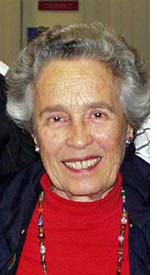By Eileen Wingard

SAN DIEGO — Rachel Barton Pine informed us, as she opened her recital at San Diego State University, that she was not Jewish. In fact, with the exception of the Nigun by Bloch and the Hebrew Melody of Achron, she had never played any of the selections on the Jewish Studies program prior to preparing for this evening. That may be why the entire program was performed, not from memory, but with music stand in place.
What she did not tell her audience was about the horrendous accident she suffered in 1995, when a commuter train ran her over, severely injuring both her legs. However, witnessing her cautiously walking backwards down the stairs, clutching the railing as she descended into the hall, her violin, a beautiful Guarneri Del Gesu, carried by her husband, we recognized her handicap.
Pine’s performance was a testament to her courage, to the universality of music, and to the pedagogical talents of the Jewish-Hungarian immigrant husband and wife team, Roland and Almita Vamos, who were her teachers. In an attractive light blue gown, contrasting with her long auburn hair, Pine stood during the entire performance.
She and Yale Strom, artist in residence at San Diego State, became friends while working at Mark O’Conner’s Fiddle Camp and Strom, impressed by her talent and her personality, invited her to premiere his work in this program, Dor V’Dor: Jewish Classical Music from the 19th Century to the 21st.
The violinist’s fiery temperament was well-suited to the final work, the premiere of Yale Strom’s three movement Bessarabian Suite for unaccompanied violin. A series of virtuoso gestures, interspersed with Carpathian tunes, and full of inebriated frenzy, the music suggested tipsy humor and drunken imagination. The audience loved it and appreciated the performer’s virtuosic command of this challenging work.
Pine opened the program with Mischa Elman’s arrangement of the Yiddish song, Eli, Eli, written by Jacob Koppel Sandler (1853-1931) for a Yiddish play by Moshe Horowitz (1884-1910). The Yiddish words say, “Through fire and flame, they burned us, yet no one could turn us away from You and Your Torah,” and are a poignant outcry to God, asking why he has forsaken us. Pine and her able accompanist, the lovely and accomplished Toni James, gave the work a convincing rendition.
This was followed by the Baal Shem Suite by the great Swiss-born Jewish composer, Ernest Bloch (1910-1959).
Although the first movement, Vidui, could have benefitted from more poetic subtlety, the Nigun was given an impassioned reading and the Simchat Torah danced with rhythmic fervor.
Well-played selections by Bonime (1891-1959), Saminsky (1883-1959), Perlman (1898-2000), and Brown (1895-1974), followed. Pine concluded the program prior to Yale Strom’s premiere with a measured and heartfelt performance of Hebrew Melody by Achron (1886-1943).
Following the musical offerings, Pine sat down for a Q & A session with the appreciative audience.
*
Wingard is a retired San Diego Symphony violinist and a freelance writer specializing in music and the arts. She may be contacted at eileen.wingard@sdjewishworld.com